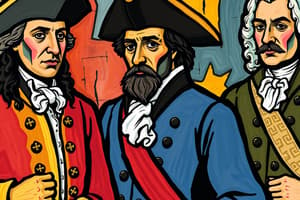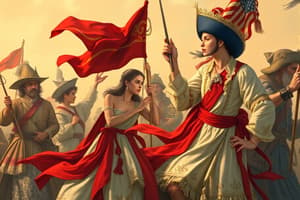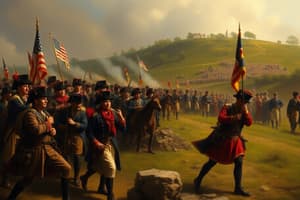Podcast
Questions and Answers
What is a loyalist?
What is a loyalist?
- A colonist with loyalty to Great Britain (correct)
- A colonist who is neutral in the conflict
- A colonist who actively protests taxation
- A colonist who seeks independence
The Daughters of Liberty formed to support the British during the Stamp Act.
The Daughters of Liberty formed to support the British during the Stamp Act.
False (B)
Who gave the famous speech, 'give me liberty, or give me death!'?
Who gave the famous speech, 'give me liberty, or give me death!'?
Patrick Henry
The first battle where eight colonists died and resulted in a British victory was at ______.
The first battle where eight colonists died and resulted in a British victory was at ______.
Match the following terms with their definitions:
Match the following terms with their definitions:
Which event marked a turning point in the American Revolutionary War?
Which event marked a turning point in the American Revolutionary War?
George Washington read 'The Crisis' to discourage the colonists from continuing to fight.
George Washington read 'The Crisis' to discourage the colonists from continuing to fight.
What was the main purpose of the Preamble in the Declaration of Independence?
What was the main purpose of the Preamble in the Declaration of Independence?
Flashcards
Patriot
Patriot
Someone who strongly supports independence from Great Britain and believes in self-governance for the American colonies.
Loyalist
Loyalist
A colonist who remains loyal to the British Crown and opposes independence.
Sons of Liberty
Sons of Liberty
A group of colonists who protested against British policies, particularly taxation without representation, starting in 1765.
Daughters of Liberty
Daughters of Liberty
Signup and view all the flashcards
Committees of Correspondence
Committees of Correspondence
Signup and view all the flashcards
“Give me liberty, or give me death!”
“Give me liberty, or give me death!”
Signup and view all the flashcards
Battle of Lexington and Concord
Battle of Lexington and Concord
Signup and view all the flashcards
Thomas Paine's The Crisis
Thomas Paine's The Crisis
Signup and view all the flashcards
Study Notes
Patriotism and Loyalism
- A patriot is a colonist who believed they had the right to govern themselves
- A loyalist is a colonist who was deeply loyal to Great Britain
Groups Against British Taxation
- The Sons of Liberty was a group of protestors against Great Britain, formed in 1765.
- The Daughters of Liberty, formed in 1765, opposed British taxes, particularly the Stamp Act and Townshend Acts.
Committees of Correspondence
- Established by colonial legislatures
- Facilitated intercolonial cooperation and leadership
Patrick Henry's Speech
- Patrick Henry gave a speech advocating for independence and inspiring others to fight for liberty.
- He famously said, "Give me liberty, or give me death!"
The Declaration of Independence
- The Preamble of the Declaration of Independence explained the reasons for independence.
- It stated the natural rights of colonists and grievances against Great Britain.
- The list of grievances detailed the colonists' complaints against the British government
Revolutionary Battles and Outcomes
- The Battles of Lexington and Concord marked the beginning of armed conflict between colonists and British soldiers.
- Despite initial victories for the British, the colonists' resilience and eventual allied support with France contributed to their success.
- The surrender of Burgoyne at Saratoga was a turning point in the war, convincing France to aid the U.S.
- The Battle of Yorktown ultimately led to the British defeat.
Treaty of Paris
- The Treaty of Paris of 1783 formally recognized the United States as an independent nation, establishing borders and resolving property disputes.
American Revolution's Impact
- The American Revolution inspired other nations (in South America, Europe, and the Caribbean) to fight against European rule.
- It raised important questions about liberty, justice, and meaning for all.
Studying That Suits You
Use AI to generate personalized quizzes and flashcards to suit your learning preferences.




